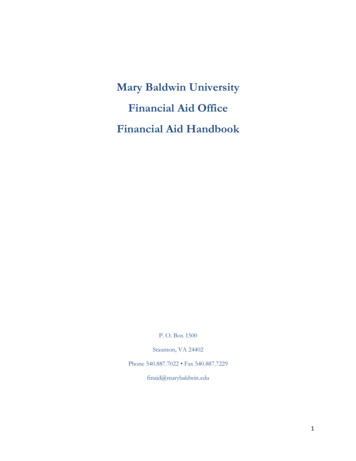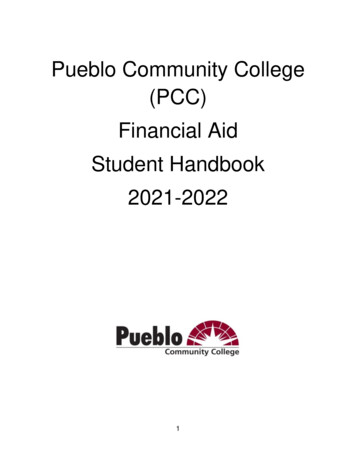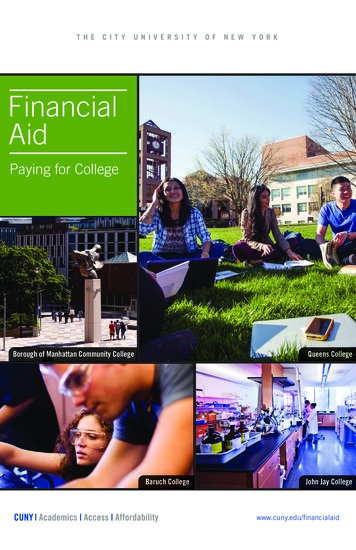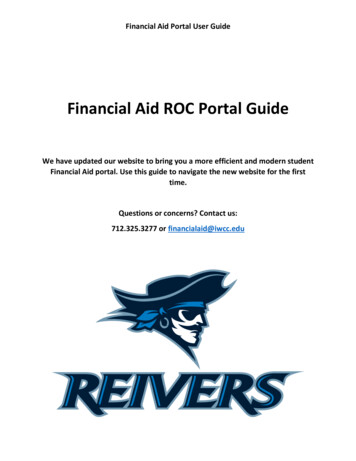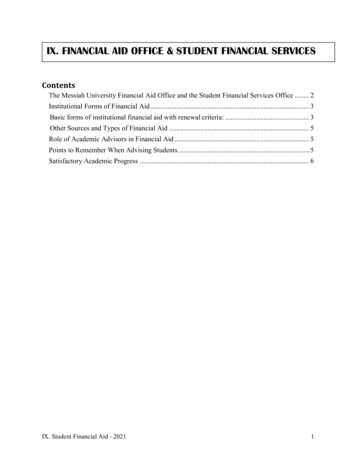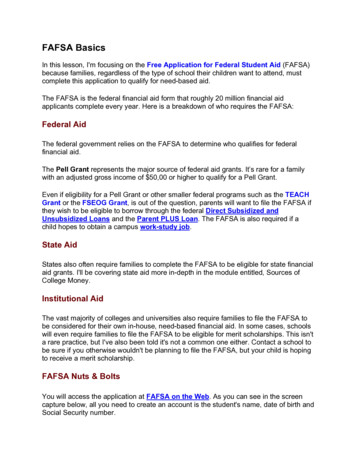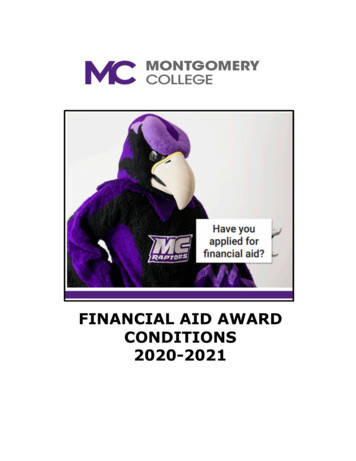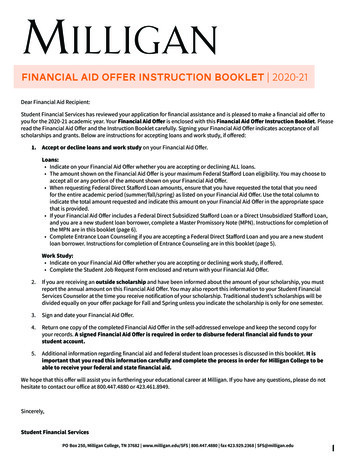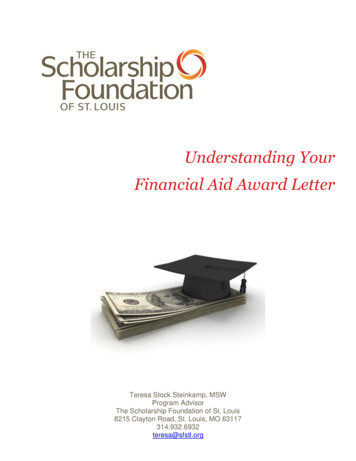
Transcription
Understanding YourFinancial Aid Award LetterTeresa Stock Steinkamp, MSWProgram AdvisorThe Scholarship Foundation of St. Louis8215 Clayton Road, St. Louis, MO 63117314.932.6932teresa@sfstl.org
2 Page
Workshop Goals1. Help you read your financial aid award letters.2. Assist you in understanding the aid being offered.3. Help you determine which aid to accept and which aid to potentiallydecline.Key TermsFinancial Aid Award Letter: A letter received, via mail or email, from thecollege(s) to which the student applied, typically in early to mid-April. Thisletter will spell out the details of the financial aid package.Financial Aid Package: A collection of different types of aid frommultiple sources (federal, state, and institutional1). It is intended to helpyou fill the gap between your ability to pay (your expected familycontribution or EFC) and college costs (the cost of attendance or COA). Itis based on your financial need, the difference between COA and EFC.1Private aid may or may not be included in a financial aid package; it will depend upon whether or not the school hasbeen notified of this award. You may need to calculate in this aid or yourself and/or expect the school will include it once ithas been made aware of all outside, private aid.3 Page
Financial Aid RefresherA form of financial aid that does not have to berepaid.A form of financial assistance that does nothave to be repaid. Scholarships may beawarded based on any number of criteria, suchas academics, achievements, hobbies, talents,and affiliations with various groups, or careeraspirations.A campus-based program, awarded by thecollege, in which eligible students work parttime to help fund their education.An advance of funds guaranteed by a signedpromissory note in which the recipient of thefunds promises to repay a specified amountunder presecribed conditions. A financial sourcethat is available to students and their parentsthrough student loan programs with varyinginterest rates and repayment provisions tosupplement the family’s financial resources,scholarships, and grants.GrantsScholarshipsWork StudyLoansFinancial Aid SourcesGovernmentInstitutionalOrganizational and GroupMembershipPrivate AidFederal and state (i.e., Pell Grant, AccessMissouri)Scholarships, grants, and even loans thatindividual schools offer to students.Aid offered to students based on affiliation to aparticular group (i.e., church group, employer,etc.)Independent scholarships and financial supportfrom companies, organizations, nonprofits, andcommunity groups (i.e., Coca-Cola scholarship,alumni scholarships, Scholarship Foundationloans, etc.)4 Page
Why is it important to compare financial aid packages?KNOWLEDGEFINANCIAL PLANNINGBARGAINING TOOLSURPRISES!MAKING A DECISIONIt is important to know what kinds of aid youare receiving, how much you are borrowing,and what the long-term consequences are.Understanding the financial repercussions isimportant. Consider how much debt you arewilling to have, what your income may bewhen you graduate, and how your debt willaffect your future plans and other life goals.Don’t be afraid to ask one school for moremoney. Once you compare aid, contact yourschool(s) to see if there is any flexibility inthe kinds of aid offered or if they have moremoney.Until you consider all of the numbers, youjust do not know which school will be themost affordable. You may just be surprised.It’s important to have all the informationwhen making such a big decision. Make aneducated decision by knowing your rights,investigating your options, and taking intoconsideration all necessary facts andconsequences.Remember: You can ask for more money orappeal a financial aid award letter, but beable to support your request with solidreasons! If you are uncertain whether yoursituation may be considered a specialcircumstance—ASK!5 Page
How to Evaluate Financial Aid Award LettersA financial aid award letter best serves the student if it answers these 5 questions:1. What is the total cost (sticker price, including books, travel, and other likelyexpenses) for one year at this school?2. How much free money (grants and scholarships) did the student get?3. How much will the student have to pay (i.e., borrow, work for, or pay out-ofpocket) for the first year?4. What are the options for raising or paying the money the student owes?5. What is the student supposed to do next? (Whom should they call with questionsor an appeal for more aid? What forms have to be submitted and by whatdeadline?)A financial aid award letter receives “extra credit” if they answer these additionalquestions:1. How many hours a week would a student have to work to earn the work-studyaward?2. What does the student have to do to renew each of the scholarships and grantseach year? What is the likelihood that the student will meet those conditions?3. What are the terms, conditions, and monthly payments of the loans?4. Is it made clear that the student or parent can decline to take any or all of theawarded loans?5. If a PLUS loan is included in the award, is it made clear this is dependent on theparents’ credit, and that parents with acceptable credit can get a PLUS loan fromany school?6. How much will it cost to graduate from this college?Still trying to estimate the true cost for the degree?1. Visit http://nces.ed.gov/collegenavigator. Enter the school name to view retentionand graduation rates.2. Calculate next year’s true Cost of Attendance by adding up tuition, fees, roomand board, books, travel, and miscellaneous expenses. Subtract free money.3. Multiply your net cost by four if the federal statistics indicate most students atyour school graduate in four years. If most students take longer, multiply by five,or even six, depending on the school. Increase the total by about 10 percent toaccount for probable inflation.6 Page
Important things to look for, consider, and ask!COSTSREQUIREMENTSFAMILYLOANS3ADJUSTMENTSNEXT YEARo Does the award letter state the school’scost of attendance (COA)?o If so, does it include ALL projected costs(i.e., tuition, fees, room, board, books,transportation, and personal expenses)?o Are all scholarships renewable?o Do you have to maintain a certain G.P.A.?o Can you switch majors and keep thescholarship?o What is your expected family contribution(EFC)?o Is there any unmet need2?o What kinds of loans did the school offer?o How much are you willing to borrow?o What are the interest rates and otherterms?o Does the school have a policy forchanging aid (known as aid displacement)if a student receives a non-institutionalscholarship?o Does the financial aid package cover thesame expenses every year?o Are grants and scholarships increased ascosts go up?2Unmet need is the difference between the cost of the school and the amount of financial aid awarded. This is beyondEFC and any loans the student must borrow.3Always, always, always read all loan obligations!7 Page
8 Page
9 Page
10 P a g e
Recommendationsfor additionalcomparison tools Award Letter Comparison phtmlThis tool is designed to help you compare and contrast the financial aid packages fromthe colleges that have admitted you. The specific aim is to highlight the differences incost of attending each school.Advanced Award Letter Comparison dvanced.phtmlIn addition to comparing and contrasting the financial aid packages from the collegesthat have admitted you, this tool also allows you to get an easy comparison of othercharacteristics that may affect your decision (i.e., size, student/faculty ratio, distance,location, etc.).Compare Aid Awards step6-1.jspThe purpose of this tool is to help you compare your financial aid award letters. Sinceaid may vary in type and amount, this is an opportunity to compare awards side-byside to determine the quantity and quality.Financial Aid Award d about how to pay for college? This website is designed to allow you to readreal college financial aid award letters, decode information and translate jargon, andfind tips on how to raise extra cash for college.Student Loan Repayment standardcalculator.htmEstimate your federal student loan payments under a standard repayment plan (equalpayments) with this calculator.11 P a g e
What happens if I cannot afford the true costs of my school?o Appeal financial aid package with yourFind more aid!oReduce costs!Change your plan!ooooooooschool:o Special Circumstances Appealo Competitive AppealLook for additional scholarships:o www.StLouisGraduates.orgo www.fastweb.como www.finaid.orgo www.scholarships.como www.studentaid.orgLive at home if possible.Sharing housing with other students.Work a part-time job.Avoid bringing cars to school if possible.Take CLEP tests (in moderation)!Consider a less expensive school or onethat offered more aid.Consider two years at the communitycollege and then transfer (there are stilllots of great scholarship opportunities fortransfer students)!Have A ? USE IT! This is a greatopportunity to save money while workingtoward your ultimate goal. Also,investigate if your school offers ascholarship for A eligible students.12 P a g e
Should you appeal your financial aid award?By Phone vs. Face-to-FaceFor routine matters, like getting the answer to a straightforward question, a phone callis the easiest way to get in touch. Communication by email and letters come next, butyou may have to wait longer for an answer. Look over the award letter before youcontact the financial aid office. If you have a serious problem, the best way to addressit is with a visit. Make sure to call and schedule an appointment.Provide Clear Supporting InformationYou should be ready to support your request with accurate and complete financialinformation. If you feel that a college has underestimated your family’s financial needor if circumstances have changed since the aid application was completed, you mayhave to provide income statements or expense records. If you would like to beconsidered for additional aid because another college is offering more money, bring acopy of the other college’s letter.NegotiatingDo not expect to negotiate. Instead of using the term negotiate, financial aid staff referto this process as an appeal.Financial Aid Award AppealsIf you have a good reason, financial aid staff do not mind if you ask them to take asecond look. It usually means you have enough interest to want to reach a bottom linethat your family can afford. What are good reasons to appeal your aid award?Financial—If your family cannot afford the family share, be prepared to presentinformation about your financial circumstances. This can include showing newinformation. Success for this type of appeal depends on whether the aid office decidesto increase your need and has money to add to your award.Competitive—You may also appeal because your first choice college has givenyou less aid than other colleges. Show your first choice school a copy of the othercollege’s award letter and ask if they can improve your package. Success depends ona college’s policy towards competitive appeals.Does it pay to appeal?Yes, because you may receive more money and there is little chance you will receiveless. However, it takes time to prepare an appeal and time for the college to act on it.Don’t prepare an appeal just “because.” If you can articulate and support your requestfor more aid, give it a try. Even if your appeal does not work out, keep in touch with thefinancial aid office.13 P a g e
10 Tips for Getting More Financial AidClark, Kim (2010) U.S. News & World Report10 Tips for Getting More Financial Aid:Schools are approving a record number of appeals and giving more aidDO:o Make sure you have filed all necessary applications (i.e., FAFSA, CSS/FinancialAid Profile).o Check your college’s financial aid website. Look for instructions/forms for filing anappeal.o Send a letter asking for a “professional judgment” review of your award. Givespecific reasons why you need more aid.o Provide documentation for your claims (i.e., copies of W2s, tax forms, hospitalbills, etc.).o Send the appeal and documentation as soon as possible. Some aid is firstcome, first served.DON’T:o Lie or shade the truth. Financial aid officers will ask for evidence and they willscrutinize it. The government can take back aid, fine you, and even send you toprison for lying on the FAFSA.o Let shame, embarrassment, or ego stop you from filing a legitimate appeal.o Demand grants to replace federally subsidized Stafford or Perkins loans orearnings from a work-study job.o Expect a bankruptcy filing to guarantee you more aid.o Have your appeal filed by your accountant. Financial aid officers say the mostpersuasive appeals are filed by students themselves. Letters from parents alsoare often rewarded.14 P a g e
1. Help you read your financial aid award letters. 2. Assist you in understanding the aid being offered. 3. Help you determine which aid to accept and which aid to potentially decline. Key Terms Financial Aid Award Letter: A letter received, via mail or email, from the college(s) to which the student applied, typically in early to mid-April. This
